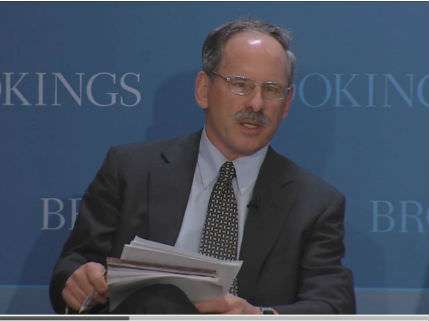Why Prohibitionists Have an Interest in Allowing Marijuana Legalization

It has been five months since residents of Colorado and Washington voted to legalize marijuana, and the Justice Department still has not said how it plans to respond. In a new Brookings Institution paper, legal analyst Stuart Taylor argues that the Obama administration should not only refrain from trying to stop these experiments but should negotiate "cooperative enforcement" agreements with officials in Colorado and Washingtion aimed at minimizing diversion of newly legal recreational marijuana to other states. Taylor argues that such agreements, which are authorized by the Controlled Substances Act, would serve the interests of prohibitionists as well as legalizers, since any attempt to prevent state-licensed pot stores from opening would foster unregulated production and distribution. "The best way to serve the federal interest in protecting public health and safety is not for the federal government to seek to abort state legalization," he writes. "To the contrary, a federal crackdown would backfire by producing an atomized, anarchic, state-legalized but unregulated marijuana market that federal drug enforcers could neither contain nor force the states to contain."
Yesterday Taylor outlined his thesis at a Brookings panel discussion that also included UCLA drug policy scholar Mark Kleiman, who is advising the Washington State Liquor Control Board on how to regulate the marijuana stores that are supposed to start opening there next year; Washington's attorney general, Bob Ferguson, who said he would like to resolve conflicts between state and federal law amicably but is prepared to fight any attempt to shut down legalization; and Rep. Earl Blumenauer (D-Ore.), who has sponsored legislation aimed at freeing states to pursue their own marijuana policies. (The panel was moderated by Reason contributor Jonathan Rauch, who argues that "the states should lead on marijuana policy.") If the Obama administration decides to crack down, the panelists seemed to agree, it could put pot shops out of business pretty easily by threatening them with forfeiture and prosecution. But that would leave an alternative, quasi-legal source of supply in each state: home cultivation in Colorado, where people are now allowed to grow up to six plants for their own recreational use or to share with friends (up to one ounce at a time, "without remuneration"), and medical marijuana collectives in Washington, which Kleiman portrayed as loosely regulated and ready to pick up any slack should the feds block state-licensed marijuana outlets. If marijuana is legally available in stores, most pot smokers will buy it there; if not, the gray markets will thrive, making the industry much harder to control.
Washington's legalization initiative, I-502, does not allow home cultivation, and the state's medical marijuana collectives came into existence through a haphazard process similar to what happened in California. By contrast, the home cultivation provision in Colorado's Amendment 64—creating what Kleiman called "this weird, two-tier system with a sort of liquor-style control on a taxed and regulated market and a Wild West, grow-your-own" option—was intended all along as a safeguard against state inaction and/or federal resistance. It is looking smarter by the day, since there is no way the feds, who account for less than 1 percent of marijuana arrests, can hope to shut down myriad home growers, and they cannot force state or local officials to help them. At the same time, the prospect of an interstate black market fed by all those small-scale, notionally nonprofit operations creates an incentive to step back and let legalization proceed as planned.
If the feds are smart, Taylor argues, they will actively encourage appropriate state regulation rather than opposing it or maintaining a two-faced, mushmouthed position that Kleiman described by rapidly running his finger up and down his lips while making nonsensical sounds. The Obama administration chose that last course (if chose is the right word) in response to medical marijuana, as Taylor shows in a devastating appendix to his paper, subtitled "A Study in Chaos." Kleiman seemed to agree that clarity is preferable, although he noted that any policy of restraint can be easily changed if it is not grounded in statute and that marijuana growers and retailers would remain vulnerable to prosecution as long as the federal ban remains in place. "The first choice might be to legalize the substance nationally," he said, although he does not see that happening until "sometime in Hillary Clinton's second term." Another possibility, he said, would be legislation protecting cannabis businesses in states with regulatory plans that meet federal approval, but he does not think that is likely anytime soon either. Blumenauer was more optimistic about the short-term prospects for congressional action, saying piecemeal reforms, such as legislation clarifying that accepting bank deposits from state-legal marijuana businesses does not qualify as money laundering, could have an important impact on the emerging industry.
You can read Taylor's paper here and watch the panel discussion here.


Show Comments (127)